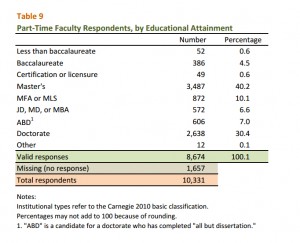Most adjunct professors in the United States lack a PhD or other comparable terminal degree. Surveys of the past decade have consistently attested to this fact, indicating that only between 18% and 30% of current adjunct faculty possess a doctorate. Many of those faculty who do hold terminal credentials are highly qualified scholars. A portion of the remainder are ABD, or holders of Master’s degrees who competently teach introductory level courses in which a Master’s is likely sufficient training. Still, the harsh reality of inadequate academic qualifications is probably the single biggest obstacle that most adjuncts face in the quest to obtain a more permanent form of academic employment.
The reason is simple. Doctorates are overproduced – especially in the humanities. In almost any given year, there are more new PhDs granted in many of these fields – think English, History, Philosophy, and almost all of the ___ Studies departments – than there are available job postings. The resulting glut means that several PhD holders will be unable to obtain academic employment.
Note that, by virtue of their degree alone, each and every one of these unemployed PhD-holding applicants automatically has a stronger CV than practically anyone who stopped at the Master’s level or below. Yes, there may be a few exceptions of well published MA holders or persons who are hired on career experience rather than academic credentials, but they are rare. The inescapable reality is that the PhD has become a bare minimum prerequisite to even make the first cut of the job application stack, let alone obtain an interview for a tenure track position. To put it bluntly, if you apply for a tenure track job at anything even remotely resembling a serious academic institution and you do not have a PhD, you are likely living in a fantasy land. Your application will not even be considered for the simple reason that there are 100 other people ahead of you who possess the PhD that you lack.
A small and noisy segment of the adjunct activist community has recently become aware of this obstacle. Rather than rectify the deficiency on their respective resumes though, they have chosen to attack the very notion of the credential. Consider the following article by adjunct activists Maria Maisto and Seth Kahn, which appeared in the AAUP’s May-June 2016 newsletter. Critiquing another author who pointed out the overwhelming lack of this minimal qualification among the adjunct community, they editorialize:
“Their insistence on terminal degrees for tenure-eligible positions—despite the fact that the majority of contingent faculty don’t have such degrees and without substantial evidence that they’re helpful, much less indispensable, for teaching-intensive positions—leads to the book’s deepest disappointment: the authors acknowledge the injustice their proposal would do to long-serving adjuncts but offer no solutions except to allow them to keep working in contingent positions.”
The position Maisto and Kahn argue for is nothing short of insanity. They are effectively arguing that unqualified adjuncts with admittedly weak academic credentials are somehow entitled to the scarce number of tenure track jobs in a glutted academic market, even if granting these jobs to MA-toting adjuncts would also place them ahead of potentially hundreds of better qualified academics who actually meet the minimum degree expectations for a position. Never mind that a typical PhD requires 4-10 years to complete, whereas a Master’s can be finished in 1-3. As with most other aspects of their political cause, these adjunct activists actually eschew and demean merit as a basis for hiring. They continue with an uncharacteristically revealing concession. Merit-based hiring, they absurdly contend, is also somehow “sexist” and “ageist” since it advantages young people with PhDs in hand:
“Clearly, requiring terminal degrees could cost many women (disproportionately those with family responsibilities) an opportunity for secure, tenure-track employment. Age is also a significant factor in the mistreatment of adjunct faculty, with older adjuncts least likely to be considered for full-time positions and most likely to be pushed out of departments (see, for example, “No Country for Old Adjuncts” and “The Age(Ism) of Diversity,” both articles from Inside Higher Ed). It is admirable to support new and recent PhD recipients, but not at the expense of women and older faculty members, with or without terminal degrees.”
Note that at no point does their argument even acknowledge that the lack of a terminal degree renders their expectations of tenure unrealistic, or that applying for a job without the minimal qualifications might signal a deficiency in one’s own application. It’s always somebody else’s fault – somebody else’s fault that they don’t possess the minimum qualification for the job they seek, somebody else’s fault that they don’t research or publish, and somebody else’s fault that faculty hiring committees place their applications in the reject pile.
Strangely, they never consider that perhaps the reject pile is exactly where these under-qualified adjunct activist applicants belong. Though I disagree with many adjunct activist arguments, I’ve never contended that they should be dismissed out of hand. The avowedly anti-meritocratic position advanced by Maisto and Kahn signifies however that they are not interested in a serious discussion of the problems facing adjuncts. Rather, they seek only job protectionism for under-qualified and under-performing applicants on the flimsiest of grounds only to poison the discussion with cheap allegations of “sexism” and “ageism” when their absurdly unrealistic expectations of the academic job market are challenged with uncomfortable but empirically attested realities.
